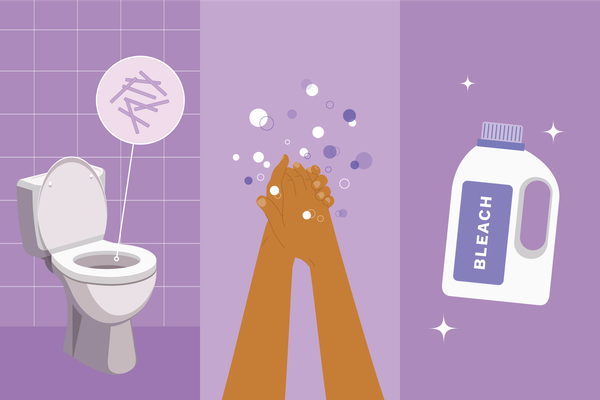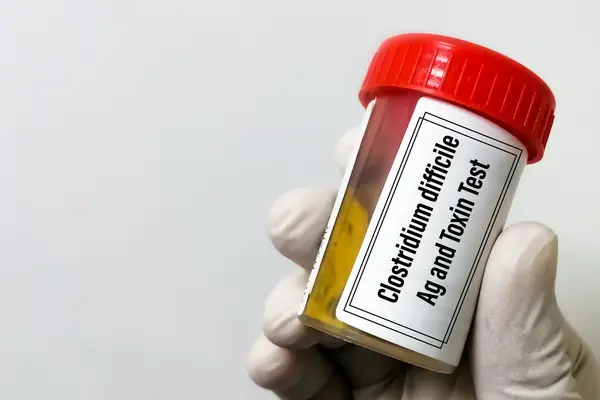Stomach viruses tend to strike quickly, cause some serious trouble in the digestive system for a few days and then vanish as quickly as they arrived. But C. diff is a different kind of stomach bug. It’s a bacterial infection that’s different in a few key ways. How? The first hint is in its name: Clostridioides difficile. C.diff can be difficult because it’s the stomach bug that might not leave, even after the party in your colon is over and your symptoms have disappeared. In fact, up to 1 in 4 people who get C. diff for the first time will have a recurrence after they stop treatment. The second is that active C.diff infection kills 15,000 to 30,000 people per year.
We spoke with Maria Vazquez Roque, M.D., a gastroenterologist at the Mayo Clinic, about recognizing and treating this serious intestinal foe.
How is C. diff contracted? Is it airborne? Contagious?
C. diff is contagious, but it’s not airborne. It’s transferred through what we call the fecal/oral method: It travels on unwashed hands or hands that haven’t been washed well enough. A person can get infected by touching a surface that’s been infected, like a door handle or a bed rail.
What are the main symptoms of C. diff?
C. diff attacks the colon, so it causes fever, chills, abdominal pain, nausea, diarrhea, vomiting and dehydration.
Do you have to quarantine or isolate after contracting C. diff?
Not in the way we quarantine or isolate for Covid. If you’re around someone who has been infected, you want to be really strict about taking proper precautions. You want to have good hand hygiene, especially if you live with a person who has the infection. [Editor’s Note: You must use soap and water for proper hand hygiene. Hand sanitizers can not protect against C. diff.]
Once you contract C. diff, does it ever go away completely?
It may or may not. Once you get C. diff, you can carry the bacteria without symptoms. It’s not easy to tell if a person is cured or if the bacteria is just dormant (inactive). We can’t take a good culture of C. diff when it’s dormant because it doesn’t grow well in a lab. The bacteria may stay inactive and not cause any issues for a while. But if it’s still there, it can become active again, especially with additional antibiotic use, which can disturb the healthy balance in the gut. We’ve found that people with inflammatory bowel disease (IBD) are more likely to have a recurrence.
What are some signs that C. diff is recurring?
If the person experiences diarrhea again within eight weeks of the original infection, with a range of gastrointestinal (GI) symptoms like stomach pain and nausea, we suspect C. diff is recurring. If that happens, it’s important to see your healthcare provider so you can get tested and treated.
What provider should I see if I am experiencing symptoms of C. diff?
A primary care provider can easily order a stool study. You can also see a gastroenterologist or an infectious disease specialist. If you don’t have access to a primary care provider, you’ll want to seek urgent care, depending on the severity of your symptoms.
How is C. diff treated?
Antibiotics. There are two kinds prescribed for C. diff: vancomycin and fidaxomicin. When these two aren’t possible, there is also an antibiotic called metronidazole for mild infections. If your antibiotic isn’t working, you might want to talk to a specialist, like a gastroenterologist or infectious disease specialist. There are also new options that the FDA approved in the past year that have been shown to help prevent C. diff recurrence after standard treatment with antibiotics.
Do certain antibiotics increase your risk for contracting C. diff?
Yes. It’s important to note that antibiotics don’t cause or create C. diff; they just can activate inactive C. diff if it’s in your system. Any antibiotic can do this, but some common offenders are clindamycin and fluoroquinolone.These are known to cause greater disruption to the gut than other antibiotics.
How do you prevent C. diff while taking an antibiotic?
So far, there is no solution that is sure to work. Some published data shows that using a probiotic while taking an antibiotic may reduce the risk, but more evidence is needed to make specific recommendations. One important way to prevent flare-ups is to practice good antibiotic stewardship by taking them as prescribed and asking for the shortest duration and narrowest spectrum prescription possible.
This educational resource was created with support from Seres Therapeutics and Nestle Health Science.






